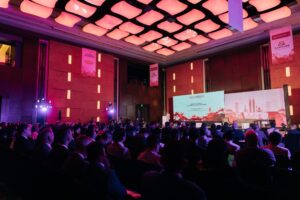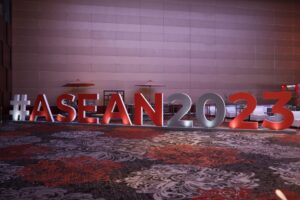PH Senator Sherwin Gatchalian: time to end all POGOs [podcast]
The end of all POGOs. That’s the objective of Philippine Senator Sherwin Gatchalian. Speaking to AGB, the official says that just ending POGOs is not enough to restore the country’s reputation, also calling for a complete restructuring of the regulatory body – confining PAGCOR to only be an operator, while setting up a new regulator – the opposite of PAGCOR’s current divestment plans.
The official’s main concern is human trafficking, following a new investigation by the nation’s Department of Justice into alleged misconduct by an entity in Clark Freeport Zone.
Find the transcript below:
So I’d like to kind of start with the most recent. So obviously, we have the DOJ now going and talking to pack four, they want to review the licenses. What are you expecting the outcome of that review to be?
Well, definitely, that’s something new that we are seeing with POGOs. I’m sure you’re well aware of what POGOs are and their operations, but we’re seeing a trend right now, and this is also based on our talks with some government agencies and also the news reports from the DOJ that the focus is morphing from pure gaming. Some of them are going into crypto scams or other scamming activities. And this is a cause of concern because they’re morphing into a scamming activity.
But deeper than that, is the human trafficking issues. I wouldn’t be surprised if these scamming activities are indeed related to the POGO entities. And we’re also doing our own cross-checking to see if these entities are the POGO entities or even though the names are not the same, but the addresses are the same. Apparently, they can change names easily, but the addresses are the same. So we’re also doing our own validation internally and also with the authorities.
You have previously said that POGOs are “useless”. Your evaluation from the Senate Means and Ways Committee said that the POGOs themselves are “useless”. Why would you say that the operators are “useless”?
The revenues that we are deriving from POGOs, based on the 2022 report, is less than a percent of our total revenues, meaning the contribution to the total tax revenues of the country is less than 1 percent. In terms of economic contribution, it’s also less than 1%. So in other words, if POGOs disappear from our shores, we will not feel it.
But we feel the crime that is happening. For example, the Chinese embassy sent a letter to the National Bureau of Investigation as late as February of this year, asking for help because some Chinese individuals are held against their will in POGO facilities. We also got reports from the National Bureau of Investigation that just this year alone, January, February, March, there were human trafficking reports that were reported to the National Bureau of Investigation.
So my point there is we’re not getting the revenues that were promised to the Philippines, but yet we’re getting the crimes and we’re feeling the crimes that are being perpetrated here in the Philippines. And the adverse impact because of those crimes happening in the Philippines is our reputational damage.
The reputational damage that’s being created by this crime deters investments from coming in, and deters tourists from coming in, so it’s not contributing to the Philippines. So my point there, it’s useless because even though they disappear from our shores, we won’t we won’t feel it. But we feel the crime that is happening because of their presence.
Now, President Marcos himself has said that he is in favor of shutting down POGOs if that’s deemed to be the best option. I know that you’ve spoken with him before. Have you heard any updates from the president regarding his viewpoint on shutting down POGOs?
I submitted my report to Malacañang, to the Palace, because the executive secretary in one of the hearings here mentioned that they want to see the report. They’re also doing their own due diligence, but they also want to consult the Senate and cross-check the facts in our investigation. So we I submitted that about two weeks ago. So I think they’re in the process now of evaluating what is best for the country.
Now, there was also a mention of maybe giving them three months to completely close up operations, shut down everything, and eject all the foreign nationals. Do you think that that’s an accurate timeline, if there is the decision to completely cancel all Pogo licenses?
That three months was based on their own analysis on winding down a firm in the Philippines, there are certain documentary requirements to wind down any businesses any business in the Philippines. So our estimate is about three months. That’s why we suggested that three months is the most appropriate for example, to wind down your business permits to cancel all the working permits of the employees. So three months is just the right time. But the most important here is let’s put an end to POGOs – whether it’s three months or longer, or immediate. Let’s really put an end to pogos because it’s destroying the image of the country.
Now speaking of the report that you submitted to Malacañang, did you find any positive aspects to POGOs?
Well, there were promises. In fact, if you look at the timeline, and if you look at the debates of the POGO law, that’s RA11590, basically, the reason why we came up with a law, that’s in Pogo, is because the industry promise, the Philippines and the Department of Finance were made to understand that the poker Revenues can go as high as PHP40 billion PHP50 billion a year. But that didn’t happen. Last year, the collection for POGOs is about PHP3 to PHP4 billion. So that’s a far cry from the estimated, but the crime being linked to POGOs, from 2019 2020 2021, even this year, are once done.
Now, PAGCOR has hit back on some of the statements that were made about POGOS and the negative contributions that they’ve had. They’ve pledged to clean up the industry and ensure that only regulated operators are working. Do you think that PAGCOR work could be successful in trying to eliminate all of the negative aspects of pogos, while still letting them be licensed in the country?
Definitely not. There’s a fundamental flaw in the structure of PAGCOR, it’s a regulator and an operator in one. On one hand, they’re making so much money from POGOs. On the other hand, they’re regulating POGOs, meaning forcing POGOs to follow the law. And if the force goes to follow the law and regulation, it will eventually cut a lot of the revenue stream.
So on one hand you want more revenue, the other one you’re regulating it. So in my view, if this fundamental flaw is present, as long as it’s there, it’s not going to be effective. And we’ve seen it since 2017. PAGCOR’s statement is always going to clean up or operate with the authorities coordinate with the enforcers, but it’s not happening because of that fundamental flaw.
Now, there have been large changes to the composition of PAGCOR. And also chairman Temgco did say that he was looking forward to divesting the assets of PAGCOR. So Casino Filipino, in particular. I understand you’re of the contrary viewpoint, you would like to make PAGCOR an operator only and set up a new regulatory body. Is that correct?
Correct. Correct. I think that the fundamental structure that we’re thinking is to separate the regulatory body and the operating body. The operating body can be PAGCOR in that setup, let’s say gaming regulatory body. I think that is a faster setup. And then eventually, the operating body can be sold off whether privatized, issued to the stock market, but that can be monetized which can eventually be a source of revenue.
But what’s important here is the regulation because PAGCOR’s was doing so many things. It’s regulating land-based casinos, it’s regulating online casinos, it’s regulating slot machines. So it’s regulating so many things. So the new entity has to focus just on regulation, making sure that regulation and laws are followed.
So that would involve, I’m assuming, a complete rehaul, a new structure. Would you see any of the individuals such as chairman Tengco that are currently in PAGCOR shifting over to that new regulatory body? Or would you start from scratch?
That’s a very, that’s an excellent question. Because every new administration, and you can look up the records. Every new administration, their campaign promise, and their promise to the people is always to privatize PAGCOR, to sell off PAGCOR. But once they’re there, and they enjoy the perk s of PAGCOR, they forget about these things.
I’ve heard the privatization model and promised so many times, but I think what happened here because of POGOs, it became so glaring that the conflict of interest is not working, and it’s costing lives in our country, because the conflict of interest. As a regulator PAGCOR should be the one really pushing to shut down POGOs, to investigate POGOs, but they’re not doing that. Of course, they say they’re coordinating it, but there’s no push. That’s why we’re seeing all of the criminal activities flourishing in our country.
What about in terms of the regulatory body? You mentioned that PAGCOR has so many different things it does I mean, it has to regulate POGOs, PIGOs – including In sports betting online casino, it has the land based casinos itself, it has its own casinos. Do you think that the new regulatory body should have all of the same functions? Should they be regulating land based and online? Or should there be a split between that?
Well, the model that we are looking at is the model in the States. Well, personally, the model that I’m looking at is, so there’s one regulator that regulates all games of chance, whatever that is. And then you have the private sector, going into operations. And all government does is to regulate the private sector. Whether the regulation comes in the form of gaming tax, or other forms, government that focuses on regulation, making sure that they follow the rules.
For example, and I’ll give you a very basic example of guilty like gambling addiction, that’s a real problem. Also, it might be not as highlighted in the Philippines, but PAGCOR has, because it’s doing both things, it doesn’t promote, to stop gambling addiction, because on the other hand, they’re making money on gambling addiction, but on other hand, they know it’s morally it’s that good for the country. So that’s another glaring conflict of interest that’s not working to the best interests of society.
It’s interesting, you mentioned that because during the pandemic, there was the commencement of Pecos. So when you’re speaking about gambling addiction, I’m assuming you’re speaking mostly about local Filipinos, right? And you’re trying to avoid getting eviction within the country. So what is your viewpoint on Pecos? Should they also be allowed?
It has to be regulated, it has to be regulated. From what I understand from PIGOs, it’s allowed to get local bets. And I think these are sports oriented., online bets, if I’m not mistaken, but it has to be regulated. Number one, it cannot be they cannot accept bets from minors. Second, we have to make sure that there’s a certain limit limit on that as well.
It cannot be unabated. If you remember the e-Sabong, if you’re familiar with that, the e-Sabong was a disaster. In fact some of the politician said it’s it was a new drug, a new shabu, because everyone was addicted. As young as 6 years old were betting. So it should not repeat that mistake. Because e-Sabong created a lot of societal problems, broken families, and policemen getting indebted. That should not happen anymore. So in other words, we have to regulate that form of gaming.
Now, I understand that your your family does have some ties to the gaming industry. But I wanted to ask, are there positive aspects to gaming overall? We’ve seen the great success of Entertainment City, we’ve seen the growth of Clark, we’ve seen what this can do in terms of the creation of jobs and training opportunities.
So is there a part of the gaming industry which needs to remain in the Philippines, basically land based? And should the Philippines be looking to eliminate some of the other online options?
Well, my view on gaming is that there are a lot of successful models that we can study and emulate that, for example, Macau, Las Vegas, even Singapore, they started attracting gaming companies to come in and Singapore is much more conservative when it comes to governance.
So my my view on gaming is we have to regulate it, meaning we have to make sure that those who are below 18 cannot go and bet, We have to make sure that there is no gambling addiction. We have to make sure that access is also very limited. And my view is that gaming should be a contributor to our economy, meaning they should also have investments coming into the country.
For example, land-based here in the Philippines, in the gaming area, those brought in investments, those brought in capital goods, at that same time, it created jobs, 1000s of jobs. So the gaming entity should contribute to the economy as well as to employment. That’s my view. That’s why, with POGOs, it’s the other way around.
If you look at the employment figures of POGOs during the hype, in 2019, they employed 120,000 employees, of which 10,000 are foreigners and 20,000 are local. So almost 80% are foreigners.
So it’s not creating the employment necessary for the country. And then we looked at all the balance sheets of the POGOs, all 101+ service provider others, 60 Plus licensees, we looked at the balance sheet that they declared to the SEC. And we don’t see any fixed investment or any capital expenditures that they brought into the Philippines.
A lot of them are leasing, meaning they find empty land and they just lease. So my point of the matter there is there’s a huge difference between land-based casinos, and online casinos, and in particular POGOs, because the land-based brings hard investments. But we have to regulate it as well. It cannot be just an open season for land-based casinos, because we have to also understand that there are consequences to gaming.
Looking at the regulator itself, there have been changes in terms of its structure we do have Chairman Tengco, who has come in recently, who come more from a business background. How would you evaluate the performance of PAGCOR so far?
I’m hoping that Chairman Tengco will take more of a practical view. And I hope he will not be lured by the perks of PAGCOR. There are a lot of perks in being the chairman and president. And I’ve seen that in the past. So I hope he pushes for reforms, one of which will be removing that one thing of interest. I think we can start from there. Let the private sector do the gaming and the casino operations, that’s what they do best.
Let the government regulate because that’s what government does best. So I think that’s a good start to reform the whole gaming industry in the Philippines. And that model is nothing new. We’ve seen that in the US. We’ve seen that in other jurisdictions. And my personal view on that is that’s a much more clear-cut structure. And that will eliminate a lot of the problems on the ground.
Looking at this year, do you expect to continue to see more of these problems with POGOs, let’s say in next two months, before some action can be taken?
Unfortunately, yes. As long as POGOs are around we’ll see a lot of these criminal activities in our country, especially human trafficking. If you look at the statistics, the top two crimes connected, to POGOs are human trafficking and illegal detention. And unfortunately, the human trafficking now is expanding to other countries, like the latest news report, I saw a third of them come from Indonesia, a third of them come from Cambodia and other countries.
So it’s expanding to other developing nations. And the sad part is it’s destroying the country’s reputation. If we will be a hub for human trafficking, that means we’re also a hub for criminal syndicates operating here. I mean, normal businessmen cannot do human trafficking. Only criminal syndicates can do that. And that’s, that’s going to destroy our country. And that’s why I’m against this, because of the peace and order situation. We want a peaceful country, we want a country that’s known for a peaceful society. But this is not going to happen while POGOs are here.
And there’s also the angle of this criminal syndicates corrupting enforcers. They might be corrupting the Bureau of Immigration, they might be corrupting the National Police. And that’s scary, that’s scary for us locals here because when we go to if these things happen. And so while it’s still controllable, and while we can still nip it at the bud.
Let’s really do the right thing, because it’s not contributing economically. I mean, it’s a no-brainer, if it’s not doing you any good, and you’re just seeing all the vices and the crime, why allow it to stay in the Philippines? We can lure our other businesses here in the Philippines that are not connected the prime.
Speaking of trying to eliminate any possible problems for the country – looking at what happened in Macau, recently, they basically eliminated junkets because they were exactly worried about criminal activity. Some of it actually was involving side betting happening in the Philippines. So would you be a proponent of keeping junkets? Do you think that there’s any problem with junket activity in the Philippines right now?
Well, just to be fair, Kelsey, I have not heard of any issues with junkets, just to be fair. I cannot answer that with certainty because I haven’t really done deeper research on that, from what I hear,I don’t hear anything.
But again, if China bans it, then there’s something wrong and it has to be a signal to us and we have to, again, look at this very carefully.
There’s another interesting angle that we should also lookup based on our research.
The Philippines is the only country hosting POGOs. Apparently, Cambodia banned it already because of criminal activities. So we’re the only country in the world that allows for POGOs to operate in their own jurisdiction. At the same time, if you look at all the tycoons in the conglomerates in the Philippines, none of them are involved in POGOs.
So my point of matter there is this is as lucrative and as profitable. That’s what they say, then all of these conglomerates {…} should be in the business of POGOs. But none of them are in that. In my opinion, it goes to show that this business is really not for the long haul, and not for a peaceful country. And that’s why as long as it’s here, we’ll see a lot of problems, a lot of issues, especially on crime.
When would you hope to see all of the POGOs closed, how soon?
It’s going to be an ongoing battle. Admittedly, POGOs are also spending a lot of money to clean up their image: online or offline media. They’re also big advertisers. So they’re spending a lot of money to clean up their image. And they’re also spending a lot of money to destroy people who are against POGOs.
I received my fair share of fake news and attacks in social media, and that’s part of the job. But from what we analyze is POGOs are also spending a lot of money to clean up this image across the board. And that’s why it’s an ongoing battle. And I will keep myself very active in this issue and continue the battle until they leave the country until the country shuts down every single bubble here in our country.













